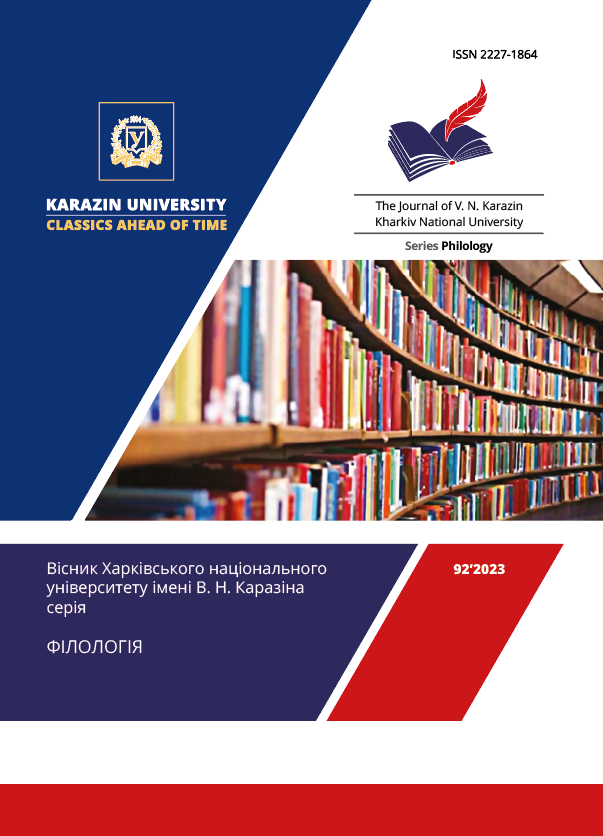Інавгураційна промова президента: традиційний та комунікативний підходи до її вивчення
Анотація
Мета цієї наукової розвідки – комплексне вивчення інавгураційної промови президента із застосуванням основних понять комунікативної лінгвістики.
Політична промова цього різновиду є важливим складником ритуалу інвеститури. Відповідно до класифікації традиційної риторики, інавгураційну промову віднесено до промов епідейктичного типу, диференційними ознаками якого вважають апелювання до поточного моменту, вихваляння та / або осуд ситуації з боку мовця, спостереження аудиторією за його ораторською майстерністю.
Виступ під час інавгурації принагідно використано для формування довіри до новообраного президента та його бачення розвитку країни. Для виконання основних завдань цієї промови, серед яких намагання об’єднати націю після виборів та затвердження спільних для аудиторії цінностей, різноманітні лексико-стилістичні засоби введено до тексту промови.
Для всебічного опису політичної промови розглянутого типу послуговуємося матрицею з семи параметрів щодо компонентів комунікації. Суб’єктом комунікації є новообраний президент, котрий звертається до нації, яка є реципієнтом комунікації і виконує роль свідка переходу влади та засвідчує легітимність процедури. Виголошена промова є публічним виступом, що готується заздалегідь спічрайтером та реалізується у формі монологу новообраного президента. Це промова ритуального типу, якщо обирати між зазначеним типом й іншими двома – орієнтаційним та агональним. Якщо брати до уваги обсяг передаваної інформації, то це промова середнього жанру. За комунікативною метою висловлювання, інавгураційна промова тяжіє до промов оцінного типу з ознаками, які притаманні інформаційним текстам. Як додатковий аспект аналізу інавгураційного виступу запропоновано історичний контекст.
Завантаження
Посилання
Zavadska, O. (2020). Inauguration speeches of Ukrainian presidents as a symbolic resource of power. Political culture and ideology, 3, 109–114. doi: https://doi.org/10.24195/2414-9616.2020-3.17.
Krapyva, Yu., & Krikun D. (2019). Political speech as a type of political communication. Transcarpathian Philological Studies, 11, 2, 42–45. doi: https://doi.org/10.32782/tps2663-4880/2019.11-2.7.
Romanyuk, S. (2015). Linguistic and Stylistic Characteristics of the Inaugural Address. Linguistic and Stylistic Studies. Lesya Ukrainka Eastern European National University, 3, 158–166.
Aristotle. (2007) On Rhetoric: A Theory of Civic Discourse / translated with introduction, notes, and appendices by G. A. Kennedy (2nd edition). The Oxford University Press.
Campbell, K. K., & Jamieson, K. H. (2008). Presidents Creating the Presidency: Deeds Done in Words. The University of Chicago Press.
Merriam-Webster. (2023). Inauguration. Retrieved from https://www.merriam-webster.com/dictionary/inauguration.
Krapyva, Yu., & Sukhenko, A. (2022). Presidential Debate (on the material of the 2020 Election Campaign in the USA). The Journal of V. N. Karazin Kharkiv National University. Series Philology, 90, 6–10. doi: 10.26565/2227-1864-2022-90-01.
Statista. (2021). Length of inaugural addresses of all American Presidents from 1789 to 2021. Retrieved from https://www.statista.com/statistics/243686/length-of-inaugural-addresses-of-us-presidents/.
Columbia College. (2021). Presidential Inauguration. Inauguration of Joe Biden. Retrieved from https://www.ccdc.edu/presidential-inauguration-inauguration-of-joe-biden-january_20th_2021/.
Shogan, C. (2020). The Inaugural Address: Origins, Shared Elements, and Elusive Greatness. Retrieved from https://www.whitehousehistory.org/the-inaugural-address.
Vassileva, M. A. (2021). Political Communication Model of the Inaugural Address Speech of President-Elect Joseph R. Biden. Rhetoric and Communications, 48, 51–63.
Vatnoey, E. (2015). Leaders’ Response to Terrorism: The Role of Epideictic Rhetoric in Deliberative Democracies. Journal of Public Deliberation, 11, 2 (5), 1–22.




